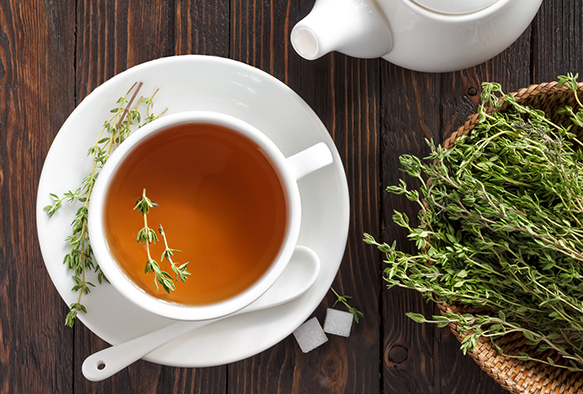What is Thyme Tea Good For? + video
What is Thyme Tea Good For? : Thyme, a small evergreen herb with aromatic leaves, is not just a staple in many kitchens for its culinary uses, but it also holds a significant place in the world of natural remedies. Among its myriad applications, brewing thyme into a tea has been practiced for centuries across various cultures. This article delves into the various benefits of thyme tea, highlighting its medicinal, therapeutic, and holistic advantages.
How to make Thyme Tea | Health Benefits of Thyme Tea :
Historical Context
Historically, thyme’s reputation precedes its culinary attributes. Ancient Egyptians utilized thyme in their embalming rituals due to its preservative qualities. The Greeks, on the other hand, saw thyme as a symbol of bravery and would often bathe in water infused with it to gain courage and strength. Moreover, the Romans would consume thyme before meals and drinks to protect themselves from poisoning. These practices hint at thyme’s broader significance and potency that goes beyond just flavoring dishes.

Respiratory Health
One of the primary reasons people turn to thyme tea is for its potential benefits for respiratory health. Thyme contains an essential oil called thymol, which acts as a natural cough suppressant and has expectorant properties. This means thyme tea can aid in loosening mucus and phlegm, making it easier to cough up. This makes the tea an effective remedy for conditions like bronchitis, asthma, and the common cold. The warm steam from the tea itself also aids in clearing congestion, making breathing easier.
Antioxidant Properties
Thyme tea is rich in antioxidants, which are compounds that help combat free radicals in the body. Free radicals can cause oxidative stress, a precursor to many chronic diseases and aging. By neutralizing these radicals, the antioxidants in thyme help in maintaining cellular health and reducing the risk of diseases. Flavonoids like luteolin, apigenin, and tannins present in thyme contribute to its antioxidant activity.
Antimicrobial Benefits
Thymol, along with other compounds found in thyme like carvacrol, has potent antimicrobial properties. This means that thyme tea can help in fighting off various pathogens, including bacteria, fungi, and viruses. Studies have shown that thyme can be effective against several strains of bacteria, including those that cause food poisoning. Additionally, it has shown promise in combating fungal infections, especially those caused by Candida.
Digestive Health
For those suffering from digestive issues, thyme tea can be a gentle remedy. The herb promotes healthy digestion by relaxing the gastrointestinal muscles. This aids in reducing gas, bloating, and the symptoms of conditions like irritable bowel syndrome (IBS). Furthermore, its antimicrobial properties help in maintaining a healthy balance of gut flora.
Mood and Cognitive Benefits
Recent research has indicated that thyme might have mood-enhancing and cognitive benefits. One study found that thyme extract improved levels of DHA (an omega-3 fatty acid) in the brain, which plays a role in cognitive function. There’s also evidence to suggest that the volatile oils in thyme can have a calming effect, helping to reduce symptoms of anxiety and depression.
Skin Health
When applied topically, the compounds in thyme can be beneficial for skin health. However, when consumed as tea, it helps in purifying the blood, which indirectly can lead to clearer skin. Its antioxidant properties also mean that it can aid in reducing signs of aging, like wrinkles and fine lines.
Supports Immune System
The combination of its antimicrobial, antioxidant, and anti-inflammatory properties makes thyme tea an excellent ally for the immune system. Regular consumption can help in bolstering the body’s natural defenses, making it more resistant to infections and illnesses.
Menstrual Benefits
Thyme tea can be particularly beneficial for women experiencing menstrual cramps. The herb’s muscle-relaxing properties can help in easing the pain. Moreover, thyme has been known to help balance hormones, which can be beneficial in managing PMS symptoms.
Safety and Precautions
Like all herbs and natural remedies, it’s essential to approach thyme tea with a sense of moderation. While it’s safe for most people, excessive consumption can lead to adverse effects like digestive upset. Additionally, pregnant or breastfeeding women, and those on medications, should consult with a healthcare professional before integrating thyme tea into their routine.
In the vast world of herbal teas, thyme stands out not just for its aromatic allure but for its multifaceted health benefits. Its rich history and varied uses across cultures are a testament to its potency and significance. Whether you’re looking for a natural remedy, a relaxing beverage, or a way to enhance overall well-being, thyme tea is worth considering.


